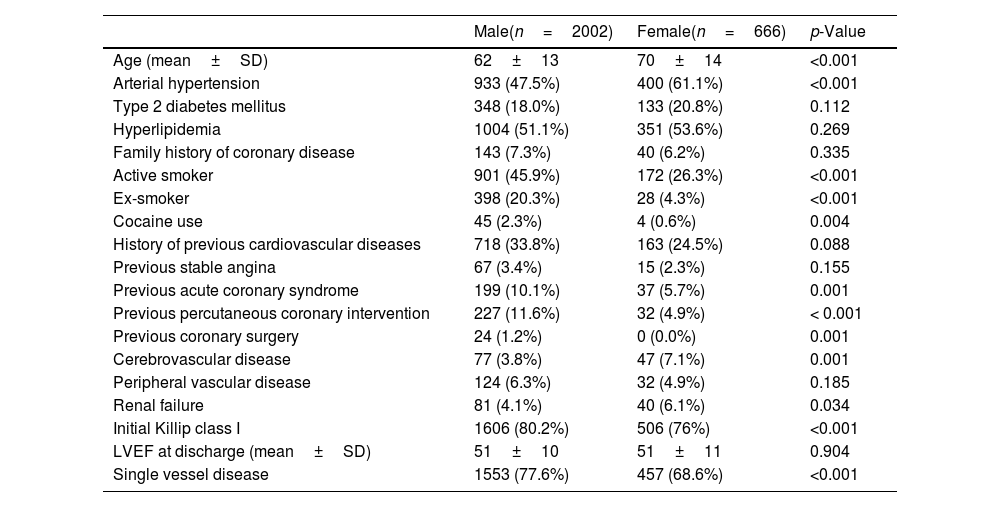The present study analyzes a cohort of consecutive patients with ST-segment elevation acute myocardial infarction (STEMI), evaluating the ischemia–reperfusion times from the perspective of gender differences (females versus males), with a long-term follow-up.
MethodsSingle-center analytical cohort study of patients with STEMI in a tertiary hospital, between January 2015 and December 2020.
ResultsA total of 2668 patients were included, 2002 (75%) men and 666 (25%) women. The time elapsed from the onset of symptoms to the opening of the artery was 197min (IQR 140–300) vs 220min (IQR 152–340), p=0.004 in men and women respectively. A delay in health care significantly impacts the occurrence of cardiovascular adverse events at follow-up, HR 1.34 [95%CI 1.06–1.70]; p=0.015.
ConclusionsWomen took longer to go to health care services and had a longer delay both in the diagnosis of STEMI and in coronary reperfusion. It is imperative to emphasize the necessity of educating women about the recognition of ischemic heart disease symptoms, empowering them to raise early alarms and seek timely medical attention.
El presente estudio analiza una cohorte de pacientes consecutivos con infarto agudo de miocardio con elevación del segmento ST (IAMCEST), evaluando los tiempos de isquemia-reperfusión desde la perspectiva de las diferencias de género (mujeres frente a hombres), con un seguimiento a largo plazo.
MétodosEstudio de cohorte analítico unicéntrico de pacientes con IAMCEST en un hospital terciario, entre enero de 2015 y diciembre de 2020.
ResultadosSe incluyeron un total de 2.668 pacientes, 2.002 (75%) hombres y 666 (25%) mujeres. El tiempo transcurrido desde el inicio de los síntomas hasta la apertura de la arteria fue de 197min (RIC 140-300) frente a 220min (RIC 152-340) en hombres y mujeres, respectivamente (p=0,004). Un retraso en la atención médica impacta significativamente en la ocurrencia de episodios adversos cardiovasculares en el seguimiento (HR 1,34 [IC 95% 1,06-1,70]; p=0,015).
ConclusionesLas mujeres tardaron más en acudir a los servicios sanitarios y presentaron un mayor retraso tanto en el diagnóstico de IAMCEST como en la reperfusión coronaria. Es imperativo enfatizar la necesidad de educar a las mujeres sobre el reconocimiento de los síntomas de la cardiopatía isquémica, capacitándolas para que den la alerta temprana y busquen atención médica oportuna.











